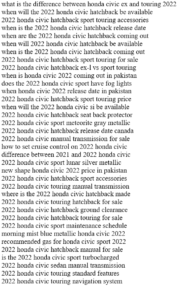This algorithm for finding related entities is only free if you already have a large database of keywords. This is something every SEO should eventually acquire because it gives you so many more opportunities and flexibility to find related terms than any other paid or free tool out there.
Process
- Search your database for keywords that contain all the terms in your keyword.
Let’s say you are in the car niche and your keyword is
"honda civic 2022". My database search produced 931 search terms such as:

- Split the keywords around common words (such as “what”, “where”, “is”) and look at the frequency of leftover terms without the seed words (remove “honda”, “civic”, “2022”), we get common entities (or concepts) such as Sport, Sale, price, touring. Or even less common words such as headlight tint, hood deflector.
- Take all the entities you need, and combine them with the most important seed words and do a new search for each one. In my case searches would be “honda civic sport”, “honda civic price” or even “honda civic headlight tint” for a less common word. We have to include seed words along with new entities because otherwise it would lead to too many non related terms. For example, one of the original entities could be Chicago (or any other city) but if we search for just Chicago it would obviously lead to millions of not related searches, while “honda civic chicago” would lead to keywords related to our business
- After all the searches are done, I was left with 280K unique search terms, with more entities than I will ever need. Once I got the entities out of the search terms (same as in step 2), I sorted the entities by frequency and ended up getting 30K entities that were not found in the Step 1. Some of the new entities are “seal plate”, “suspension bushings”, “borla exhaust”, “notchy gearbox”, all the keywords you would want to have on your car blog, or car parts store, but didn’t show up in the original search.
Conclusion
All of this took less than 2 minutes of work plus 5 minutes for the searches to be complete (depends how many searches you do in step 3, I did 1000). This shows how important it is to invest your time in learning just basic PHP and MySql if you are an SEO.
